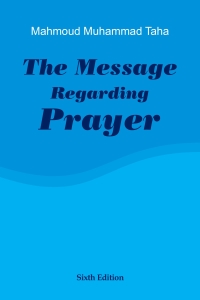What Is Prayer?
To delve into this question requires a sound understanding of the Qur’an. To facilitate this understanding, four principles must be established:
First, Islam represents both a beginning and an end. At its beginning, Islam is below the rank of faith (Iman). It entails the utterance of la ilaha illa Allah, Muhammadun Rasul Allah (There is no deity but Allah, Muhammad is the Messenger of Allah) along with acts of worship and conduct as prescribed. The Qur’anic verse regarding Islam in its beginning is: "The Bedouins say, 'We have believed.' Say, 'You have not [yet] believed; but say [instead], 'We have accepted Islam,' for faith has not yet entered your hearts." (49:14).
At its end, Islam surpasses the rank of faith and signifies conscious, willing, and satisfied submission to Allah's will. This is reflected in the verse: "And who is better in religion than one who submits himself to Allah while being virtuous and follows the religion of Abraham, inclining toward truth? And Allah took Abraham as an intimate friend." (4:125).
The essence of this verse lies in the phrase "while being virtuous" (wahua muhsin), emphasizing that all creation submits to Allah. However, a true Muslim submits consciously, willingly, and without objection. This conscious submission is likened to being in the hands of Allah as a corpse is in the hands of its washer, entirely devoid of objection or resistance, as previously mentioned.
Second, the first Muslim community of the prophetic era was referred to as "believers" (al-Mu’minun), especially when contrasted with Jewish or Christian communities. This distinction is evident in numerous Qur’anic verses, such as: "Indeed, those who have believed and those who were Jews and Christians and Sabeans, those [among them] who believed in Allah and the Last Day and did righteousness, will have their reward with their Lord, and no fear will there be concerning them, nor will they grieve." (2:62).
It is noteworthy that this community was called "Muslims" in a general sense, derived from Islam at the beginning stage. The Qur’an exhorted the believers to attain the rank of true submission (the meaning of Islam), as in: "O you who have believed, fear Allah as He should be feared and do not die except as Muslims." (3:102).
However, realizing their limitations, the Qur’an adjusted its directive, saying: "So fear Allah as much as you are able and listen and obey and spend [in the way of Allah]; it is better for yourselves. And whoever is protected from the stinginess of his self, it is them who will be successful." (64:16).
Third, a truly Muslim society has not yet materialized but will emerge in the near future, God willing, with the establishment of the new civilization described in this discourse. Within this society, all individuals will attain the level of Islam as a culmination of spiritual development. Historically, this ultimate submission has only been achieved by prophets, and even among them, some fell short, as indicated in the verse: "Indeed, We sent down the Torah, in which was guidance and light. The prophets who submitted [to Allah] judged according to it for the Jews, as did the rabbis and scholars by that with which they were entrusted of the Allah’s Scripture, and they were witnesses thereto." (5:44).
Further elaboration on this subject will be reserved for a forthcoming book entitled The Golden Era of Islam Lies Ahead. It suffices here to state that the Qur’an will be better understood when it is recognized that its address to "those who have believed", pertains to a specific stage in the evolution of the contemporary community toward the future Islamic society. For instance, when the Qur’an declares: "O you who have believed, fear Allah as He should be feared and do not die except as Muslims" (3:102), it calls for individuals to progress from the stage of faith to that of true submission, emphasizing continuous development toward perfection and renewal, rejecting stagnation at any particular level.
Fourth, the entire Qur’an operates on the principle of Mathani. Each verse, word, and even letter contains dual meanings: a deeper meaning with Allah and a proximate meaning descending from Allah to His servant. This principle is indicated in the verse: "Allah has sent down the best discourse: a Book, resembling, paired (Mathani); the skins of those who fear their Lord shiver from it, then their skins and their hearts soften to the remembrance of Allah. That is the guidance of Allah by which He guides whom He wills. And whomever Allah causes to stray, for him there is no guide." (39:23).
This concept of Mathani reflects dual meanings: a distant one pertaining to servitude and a proximate one referring to worship.
Building on these four foundational principles, we shall further explore the nature of prayer and its implications in the continuation of this treatise.

